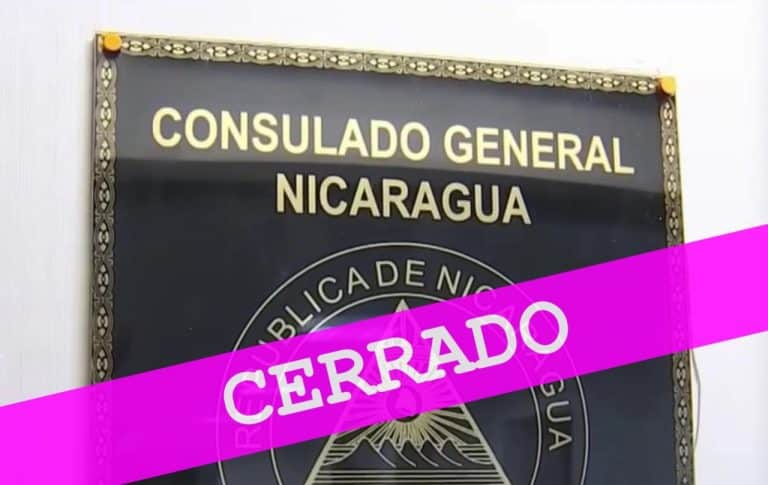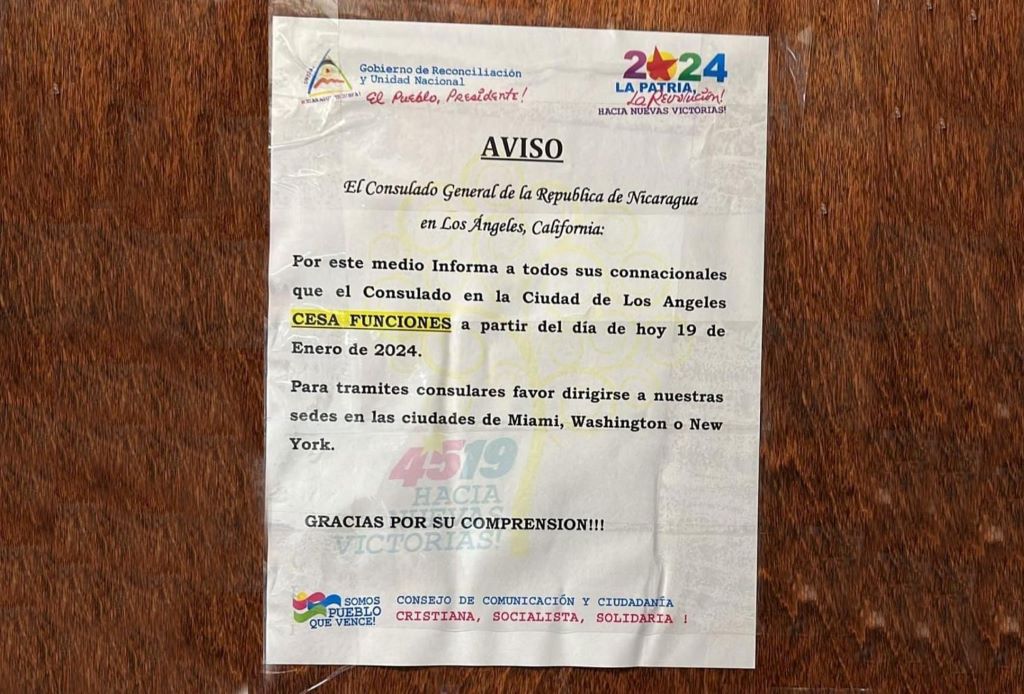6 de febrero 2024

“NicaraguAmor” Cultural Caravan for Nicaraguans in the USA

PUBLICIDAD 1M
PUBLICIDAD 4D
PUBLICIDAD 5D
Regime has not informed which procedures will be conducted in person at the remaining consulates in Washington, New York and Miami

A brief notice is all that the Ortega dictatorship has given about the closing of Nicaraguan consulates in the United States. On a piece of paper posted on the doors of the diplomatic offices in Los Angeles, California, and Houston, Texas, the authorities only indicate that for " procedures" Nicaraguans should "contact" the consulates in Miami, New York or Washington.
They do not provide a telephone number, address or e-mail address, nor do they explain whether some procedures can be conducted by telephone or virtually, which means that for any procedure, migrants will have to travel to these three cities, leading to more expenses for Nicaraguans.
Representatives of Nicaraguans in the United States believe that this lack of information demonstrates the dictatorship's "contempt" for Nicaraguan migrants in the United States, who generate more than 80% of family remittances, some 3.5 billion dollars of the 4.24 billion registered up to November 2023, according to official data.
For Damaris Rostran, member of the New York and New Jersey Working Group of the Nicaraguan Diaspora, the dictatorship has not only left as "orphans" those citizens who emigrated in recent years, but also those who have been in the United States for decades.
An estimated 400,000 Nicaraguans have arrived in the U.S. over the past five years, adding to the 400,000 others already living in the U.S. since before 2018.
According to Rostran, migrants contact consulates when they are unable to travel to Nicaragua - to do some kind of procedure - due to work issues, immigration status, transportation costs or because "the dictatorship decides not to let them enter".
The closing of the consulates in Los Angeles and Houston was announced on January 19, 2024, and the same happened one day later with the diplomatic headquarters in Tapachula, Mexico. On the same date, the closing of the consulate in New Orleans, Louisiana, which -according to Nicaraguan media- had not been operating for months, was made official.

With these closures, the only Nicaraguan consulates in the United States are in Miami, New York or Washington, all on the East Coast. This situation will represent an expense for migrants who are on the West Coast or in the center of the U.S. territory, since they will have to travel to any of these three cities to conduct any procedure.
Rostran explained that Nicaraguans will have to invest in airline tickets, lodging, food and transportation in the cities. In addition, they will lose paid work hours.
A plane ticket from Los Angeles - the second city with the most Nicaraguans - to Miami costs between 200 and 400 dollars, round trip, according to travel agencies on the Internet. The price varies according to stopovers, schedules and flight days.
"To get a birth certificate you could spend between $1,000, $1,500 or $2,000, depending on the day you travel. For example, if you travel during the week, the cost of the flight may be cheaper, as well as the cost of the hotel," the Nicaraguan explained.
She pointed out that costs will depend on the time it takes the consulate to conduct the process, since the "longer it takes", the more money is spent on lodging, transportation and food.
Harold Rocha, an expert in international law and member of the Nicaraguan diaspora in the United States, stressed that to avoid these expenses for Nicaraguans, the remaining consulates should adopt procedures similar to those that were in place during the Covid-19 pandemic, when "many other countries allowed interviews by videoconference and procedures by mail or courier".
This change, he said, must be communicated by the Ministry of Foreign Affairs or the Nicaraguan embassies in the U.S. and Mexico. But so far there has been no communiqué, nor has it been mentioned in the daily declarations of the Vice President, Rosario Murillo.
The expert in International Law indicated that Nicaraguan consulates have a "fairly broad function", although it is "focused on the attention and support to natural and legal persons holding Nicaraguan nationality".
The functions of the consulates are established by the 1963 Vienna Convention on Consular Relations, ratified by Nicaragua on October 31, 1975.
According to Rocha, the main functions of the consulates include:
Rocha clarified that there are certain functions of the consulate that require personal attention, especially among Nicaraguans who "go through immigration detention processes".
"U.S. and Mexican authorities - whether federal, state, municipal or administrative - have the obligation to inform Nicaraguan authorities, accredited in the country, of the detention or relevant event - accident or death - of a citizen, and allow him or her, if appropriate, to contact the corresponding headquarters to request support and protection," the expert explained.
"It is also common," he continued, "for immigration authorities to request the collaboration of the consulate to verify the identity and nationality of these citizens and, in case of deportation or repatriation, to request the issuance of a travel document.
"It is in these functions where the closure of these consular offices will be most noticeable, as the consulates that will remain open are geographically distant from the U.S.-Mexico border. Therefore, the chances of a Nicaraguan receiving a visit from a consular officer are diminished," the attorney warned.
This article was published in Spanish in Confidencial and translated by our staff. To get the most relevant news from our English coverage delivered straight to your inbox, subscribe to The Dispatch.
PUBLICIDAD 3M
Confidencial es un diario digital nicaragüense, de formato multimedia, fundado por Carlos F. Chamorro en junio de 1996. Inició como un semanario impreso y hoy es un medio de referencia regional con información, análisis, entrevistas, perfiles, reportajes e investigaciones sobre Nicaragua, informando desde el exilio por la persecución política de la dictadura de Daniel Ortega y Rosario Murillo.
PUBLICIDAD 3D